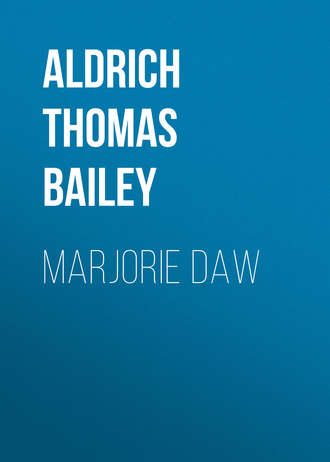
Aldrich Thomas Bailey
Marjorie Daw
III
JOHN FLEMMING TO EDWARD DELANEY
August 11, 1872.
Your letter, dear Ned, was a godsend. Fancy what a fix I am in—I, who never had a day’s sickness since I was born. My left leg weighs three tons. It is embalmed in spices and smothered in layers of fine linen, like a mummy. I can’t move. I haven’t moved for five thousand years. I’m of the time of Pharaoh.
I lie from morning till night on a lounge, staring into the hot street. Everybody is out of town enjoying himself. The brown-stone-front houses across the street resemble a row of particularly ugly coffins set up on end. A green mould is settling on the names of the deceased, carved on the silver door-plates. Sardonic spiders have sewed up the key-holes. All is silence and dust and desolation.—I interrupt this a moment, to take a shy at Watkins with the second volume of Cesar Birotteau. Missed him! I think I could bring him down with a copy of Sainte-Beuve or the Dictionnaire Universel, if I had it. These small Balzac books somehow do not quite fit my hand; but I shall fetch him yet. I’ve an idea that Watkins is tapping the old gentleman’s Chateau Yquem. Duplicate key of the wine-cellar. Hibernian swarries in the front basement. Young Cheops up stairs, snug in his cerements. Watkins glides into my chamber, with that colorless, hypocritical face of his drawn out long like an accordion; but I know he grins all the way down stairs, and is glad I have broken my leg. Was not my evil star in the very zenith when I ran up to town to attend that dinner at Delmonico’s? I didn’t come up altogether for that. It was partly to buy Frank Livingstone’s roan mare Margot. And now I shall not be able to sit in the saddle these two months. I’ll send the mare down to you at The Pines—is that the name of the place?
Old Dillon fancies that I have something on my mind. He drives me wild with lemons. Lemons for a mind diseased! Nonsense. I am only as restless as the devil under this confinement—a thing I’m not used to. Take a man who has never had so much as a headache or a toothache in his life, strap one of his legs in a section of water-spout, keep him in a room in the city for weeks, with the hot weather turned on, and then expect him to smile and purr and be happy! It is preposterous. I can’t be cheerful or calm.
Your letter is the first consoling thing I have had since my disaster, ten days ago. It really cheered me up for half an hour. Send me a screed, Ned, as often as you can, if you love me. Anything will do. Write me more about that little girl in the hammock. That was very pretty, all that about the Dresden china shepherdess and the pond-lily; the imagery a little mixed, perhaps, but very pretty. I didn’t suppose you had so much sentimental furniture in your upper story. It shows how one may be familiar for years with the reception-room of his neighbor, and never suspect what is directly under his mansard. I supposed your loft stuffed with dry legal parchments, mortgages, and affidavits; you take down a package of manuscript, and lo! there are lyrics and sonnets and canzonettas. You really have a graphic descriptive touch, Edward Delaney, and I suspect you of anonymous love-tales in the magazines.
I shall be a bear until I hear from you again. Tell me all about your pretty inconnue across the road. What is her name? Who is she? Who’s her father? Where’s her mother? Who’s her lover? You cannot imagine how this will occupy me. The more trifling, the better. My imprisonment has weakened me intellectually to such a degree that I find your epistolary gifts quite considerable. I am passing into my second childhood. In a week or two I shall take to India rubber rings and prongs of coral. A silver cup, with an appropriate inscription, would be a delicate attention on your part. In the mean time, write!
IV
EDWARD DELANEY TO JOHN FLEMMING
August 12, 1872.
The sick pasha shall be amused. Bismillah! he wills it so. If the story-teller becomes prolix and tedious—the bow-string and the sack, and two Nubians to drop him into the Piscataqua! But truly, Jack, I have a hard task. There is literally nothing here—except the little girl over the way. She is swinging in the hammock at this moment. It is to me compensation for many of the ills of life to see her now and then put out a small kid boot, which fits like a glove, and set herself going. Who is she, and what is her name? Her name is Daw. Only daughter if Mr. Richard W. Daw, ex-colonel and banker. Mother dead. One brother at Harvard, elder brother killed at the battle of Fair Oaks, ten years ago. Old, rich family, the Daws. This is the homestead, where father and daughter pass eight months of the twelve; the rest of the year in Baltimore and Washington. The New England winter too many for the old gentleman. The daughter is called Marjorie—Marjorie Daw. Sounds odd at first, doesn’t it? But after you say it over to yourself half a dozen times, you like it. There’s a pleasing quaintness to it, something prim and violet-like. Must be a nice sort of girl to be called Marjorie Daw.
I had mine host of The Pines in the witness-box last night, and drew the foregoing testimony from him. He has charge of Mr. Daw’s vegetable-garden, and has known the family these thirty years. Of course I shall make the acquaintance of my neighbors before many days. It will be next to impossible for me not to meet Mr. Daw or Miss Daw in some of my walks. The young lady has a favorite path to the sea-beach. I shall intercept her some morning, and touch my hat to her. Then the princess will bend her fair head to me with courteous surprise not unmixed with haughtiness. Will snub me, in fact. All this for thy sake, O Pasha of the Snapt Axle-tree!… How oddly things fall out! Ten minutes ago I was called down to the parlor—you know the kind of parlors in farm-houses on the coast, a sort of amphibious parlor, with sea-shells on the mantel-piece and spruce branches in the chimney-place—where I found my father and Mr. Daw doing the antique polite to each other. He had come to pay his respects to his new neighbors. Mr. Daw is a tall, slim gentleman of about fifty-five, with a florid face and snow-white mustache and side-whiskers. Looks like Mr. Dombey, or as Mr. Dombey would have looked if he had served a few years in the British Army. Mr. Daw was a colonel in the late war, commanding the regiment in which his son was a lieutenant. Plucky old boy, backbone of New Hampshire granite. Before taking his leave, the colonel delivered himself of an invitation as if he were issuing a general order. Miss Daw has a few friends coming, at 4 p.m., to play croquet on the lawn (parade-ground) and have tea (cold rations) on the piazza. Will we honor them with our company? (or be sent to the guard-house.) My father declines on the plea of ill-health. My father’s son bows with as much suavity as he knows, and accepts.
In my next I shall have something to tell you. I shall have seen the little beauty face to face. I have a presentiment, Jack, that this Daw is a rara avis! Keep up your spirits, my boy, until I write you another letter—and send me along word how’s your leg.







